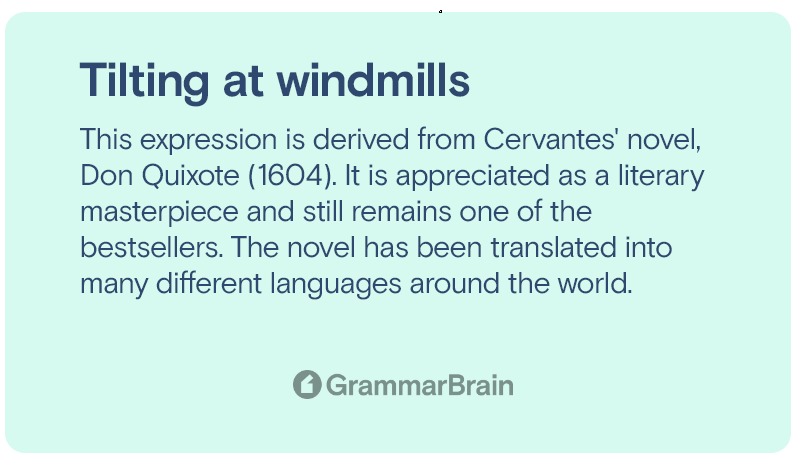What does tilting at windmills mean? Human nature is such that we tend to magnify small things to such an extent that they start causing us problems. Situations and things that can be solved with much ease overburden our shoulders with tension and fear.
Often there is no problem to be identified, however, we still want to fight things that do not even exist. In such a case, are we making a fool out of ourselves? Maybe yes!
Read the article below and understand the meaning and difference between impel and compel.

Understanding the origins of the idiom “tilting at windmills”
This expression is derived from Cervantes’ novel, Don Quixote (1604). It is appreciated as a literary masterpiece and still remains one of the bestsellers. The novel has been translated into many different languages around the world.
In the novel, Don and his faithful helper Sancho attempt to fight the all ills with bravery. In brief, the hero of the novel imagines that he will fight giants while attacking the windmills.
Thus, next time whenever you feel you are tilting at windmills, try to refrain from the act and save some time for yourself. After all, time is precious!
Meaning of “tilting at windmills”
We use idioms in our quotidian lives. Some use them more frequently than others while others don’t enjoy using them at all. However, idioms help us denote or classify a situation in very few words while striking at the right areas of any conversation.
Some idioms remain popular despite being old and often find their place in our everyday conversations in life.
The dictionary describes the phrase ‘tilting at windmills’ to represent a fight against an imaginary or non-existent enemy or problem. It can also denote problems that are not very important yet are falsely considered of utmost importance.
Therefore, tilting at windmills would simply mean wasting time on things or issues that do not really classify as problems.
Some examples of “tilting at windmills”
Sometimes concepts become difficult to grasp and this is where examples jump in. Examples help us relate to the meaning of words or phrases, ultimately helping us to understand them better.
In order to clearly and profoundly understand the meaning of the phrase tilting at windmills, it is important to go through some examples. The below-mentioned examples will help you understand the correct meaning and usage of the phrase.
Examples of the phrase:
- Rama has spent her entire life tilting at windmills. Will she ever learn from this?
- I am mostly tilting at windmills, don’t know when I will stop doing this!
- You are just tilting at windmills.
- Please get your facts right; you may be just tilting at windmills.
- Kavi always tilts at windmills whenever he falls out of words.
- My mother is always tilting windmills at my father.
- Manav can usually be found tilting at windmills when he sits alone for a long time.
- Jaya never misses an opportunity for tilting at windmills.
Hope these examples were helpful for you to understand the given phrase. Check out some more examples here.
Conclusion
Irrespective of whether you have heard this phrase before or not, this article must have clarified your understanding of what it means when one speaks of ‘tilting at windmills’. Idioms not only sound cool but also carry with them a real and to-the-point meaning of something.
So, next time you tend to tilt at windmills, take a step back and think for yourself – is this really important?
Inside this article
Fact checked:
Content is rigorously reviewed by a team of qualified and experienced fact checkers. Fact checkers review articles for factual accuracy, relevance, and timeliness. Learn more.
Core lessons
Glossary
- Abstract Noun
- Accusative Case
- Anecdote
- Antonym
- Active Sentence
- Adverb
- Adjective
- Allegory
- Alliteration
- Adjective Clause
- Adjective Phrase
- Ampersand
- Anastrophe
- Adverbial Clause
- Appositive Phrase
- Clause
- Compound Adjective
- Complex Sentence
- Compound Words
- Compound Predicate
- Common Noun
- Comparative Adjective
- Comparative and Superlative
- Compound Noun
- Compound Subject
- Compound Sentence
- Copular Verb
- Collective Noun
- Colloquialism
- Conciseness
- Consonance
- Conditional
- Concrete Noun
- Conjunction
- Conjugation
- Conditional Sentence
- Comma Splice
- Correlative Conjunction
- Coordinating Conjunction
- Coordinate Adjective
- Cumulative Adjective
- Dative Case
- Determiner
- Declarative Sentence
- Declarative Statement
- Direct Object Pronoun
- Direct Object
- Diction
- Diphthong
- Dangling Modifier
- Demonstrative Pronoun
- Demonstrative Adjective
- Direct Characterization
- Definite Article
- Doublespeak
- False Dilemma Fallacy
- Future Perfect Progressive
- Future Simple
- Future Perfect Continuous
- Future Perfect
- First Conditional
- Irregular Adjective
- Irregular Verb
- Imperative Sentence
- Indefinite Article
- Intransitive Verb
- Introductory Phrase
- Indefinite Pronoun
- Indirect Characterization
- Interrogative Sentence
- Intensive Pronoun
- Inanimate Object
- Indefinite Tense
- Infinitive Phrase
- Interjection
- Intensifier
- Infinitive
- Indicative Mood
- Participle
- Parallelism
- Prepositional Phrase
- Past Simple Tense
- Past Continuous Tense
- Past Perfect Tense
- Past Progressive Tense
- Present Simple Tense
- Present Perfect Tense
- Personal Pronoun
- Personification
- Persuasive Writing
- Parallel Structure
- Phrasal Verb
- Predicate Adjective
- Predicate Nominative
- Phonetic Language
- Plural Noun
- Punctuation
- Punctuation Marks
- Preposition
- Preposition of Place
- Parts of Speech
- Possessive Adjective
- Possessive Determiner
- Possessive Case
- Possessive Noun
- Proper Adjective
- Proper Noun
- Present Participle
- Prefix
- Predicate



